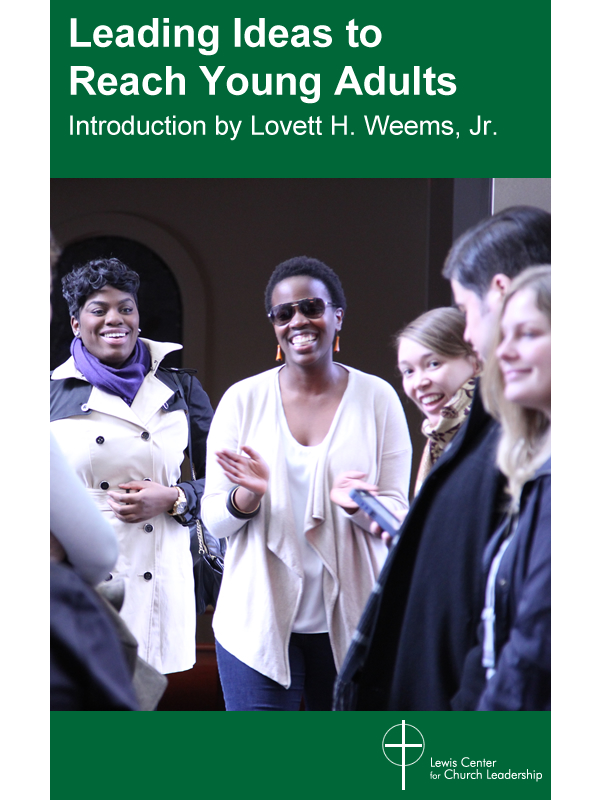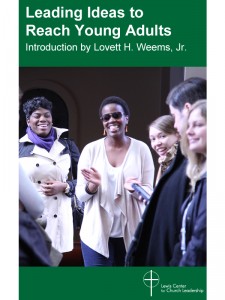
How can innovation help congregations reach new and younger people? We speak with Mikka McCracken about innovation, building relationships, and creating person-focused ministries so more people know the way of Jesus and discover community, justice, and love.
Listen on Apple Podcasts | YouTube Music | Spotify
Watch on YouTube
- Transcript
-
Announcer: Leading Ideas Talks is brought to you by the Lewis Center for Church Leadership of Wesley Theological Seminary in Washington, DC. Subscribe free to our weekly newsletter, Leading Ideas, at churchleadership.com/leadingideas.
Leading Ideas Talks is also brought to you by Leading Ideas to Reach Young Adults. This e-book is a curated collection of Leading Ideas articles plus discussion questions, and is an ideal conversation starter for those who care deeply about reaching younger generations. Learn more and order now at churchleadership.com/books.
How can innovation help congregations reach new and younger people? In this episode we speak with Mikka McCracken about innovation, building relationships, and creating person-focused ministries so more people know the way of Jesus and discover community, justice, and love.
Doug Powe: Welcome to Leading Ideas Talk, a podcast featuring leaders and innovative practitioners. I am Douglas Powe, the director of the Lewis Center and your host for this talk. Joining me is Mikka McCracken Executive Director of Innovation at the churchwide organization of the Evangelical Lutheran Church in America. Our focus for this podcast is innovation. Mikka, I’m so excited you’re joining us today.
Mikka McCracken: Hi. Nice to be here. Thank you for the invitation.
Doug Powe: Mikka, you lead the ELCA innovation hub in a first-of-its-kind effort to bring human experience questions and design thinking to solve the church’s most pressing leadership challenges. And I’m excited to talk to you about the work you’re doing, but I think it would be great for our audience if you could maybe share a bit of your story with how you come to be in this very creative position.
Mikka McCracken: Sure. Yes. Thanks for the opportunity to start with that. So yes, I have been on the staff of the churchwide organization with the Evangelical Lutheran Church in America (the ELCA) for about 12 years now, but I also happen to be a member of that faith tradition. So, I am an ELCA member. And maybe just to say a little bit about my faith journey briefly, I actually was baptized as a member of the ELCA before I was a citizen of the United States.
Doug Powe: That’s interesting.
Mikka McCracken: Yes. And I bring that up because I’m a Korean adoptee. So, I grew up in northern Minnesota in a place where not a lot of people look like me but where there are a lot of Lutherans. So sometimes I feel this, like, very insider-outsider kind of experience. But a lot of that has to do with how I understand things from the faith tradition. Being baptized and adopted into the Lord’s family has a kind of a different kind of meaning for me. And this idea … so many of the things that we pull out of our tradition in terms of being created in the image of God have been things that are so important to me since I was a child and even so today. So, it’s maybe a weird way to start, like, how I got into this type of work, but I think it really is part of who I am. And I had the opportunity to start a kind of leadership in the church at a national level. I don’t know if I ever really intended to do that, but it actually happened because I was elected as a multicultural representative.
And I think a lot of what I’ve learned about leadership and then this approach to innovation have come from this recognition that it’s almost like I stand on the shoulders of the leaders who came before me, so there was a place at the table that was reserved for a multicultural youth and that’s how I got there. Right? So, creating spaces, trusting the wisdom and diversity in which God creates us as the people that will show up there, I think has been really important for me as well. So, I spent some time with ELCA World Hunger, the church’s relief and development ministry, working toward a just world where all are fed. I learned a ton about what it looks like to trust the expertise of people with lived experience of hunger and poverty and the transformative power of that. And I mean the story of how I ended up in the actual innovation work — its a little bit of a different one, but I can go there if we’d like.
Doug Powe: That’s helpful and I appreciate how you weave together two themes we think about often — adoption and created in the image of God. And we say these words, but for you, how they take on a different meaning just because of your life story and how you have matured within the denomination and taken on these different leadership positions.
Let me dig into our topic of the day and let me begin by asking what has shaped your passion for innovation?
Mikka McCracken: Yeah, I think it’s such an interesting time to be working for a denominational church, I mean, pandemic notwithstanding. And I also happen to believe that there wasn’t just one pandemic. I mean, COVID-19 surely, but then also institutional and structural racism as an ongoing pandemic and I would even say polarization generally in the US. Right? Sixty-three percent of Americans, according to Pew, think that polarization will only get worse in the future. I’m like, wow, we’re not already there. I think when we imagine what the role of faith communities and the church is today, innovation has to do with helping the church get out there to meet people where they’re at.
I was listening to Rabbi Esther Lederman who does this work at the Union of Reform Judaism. And she talks about flipping the script. So, we expect people to come to the church. We teach them the text. And then they go back out into life. And she talks about switching that so we meet people in their life with the wisdom of the text. And I think innovation — it sounds like a cool word — and we imagine Post-it notes and brainstorming and it’s just fun and games. It’s hard work. Also, it’s not like rocket science. There are processes. There are tools. And there are ways that this can unlock our ministry.
I would also say innovation is not the end in itself. It is the means to the end. And for the ELCA where I have the opportunity to serve, we’re trying to imagine this mission of meeting a million new people so more people know the way of Jesus and discover community, justice, and love. That’s what we’re after. And we think innovation as a set of tools and a culture and a way of thinking about it that might have something to offer us in that ministry pursuit.
Doug Powe: It’s interesting that you say that. You said a couple — actually a lot — of interesting things. But one of them is where you ended, because you talked about the fact that we’re trying to meet this million people for et cetera, et cetera, et cetera, et cetera, which indicates then that mainline denominations — I’m just going to go ahead and broaden it — mainline denominations as a whole aren’t doing that well right now. We aren’t actually meeting these people to do this work.
So, I’m curious. As you know, participation is down in mainline denominations, and we’re in the midst of these cultural shifts. What do you think has caused this? How have mainline denominations gotten to this moment where you just had to describe that we’ve got to figure out how to use innovation to meet one million people.
Mikka McCracken: Yeah. The story of the decline. So, I’m somebody who actually was born in the year that the ELCA was founded. The ELCA is a tradition that was founded by the merger of three churches, and it has actually been in decline ever since. So, it’s sort of interesting for me as well to be working in innovations about, like, origin stories and the stories that we tell ourselves. And I’ve grown up with this story of the decline, I guess, of the mainline. I always joke that I worked with ELCA World Hunger where the goal was to end poverty and hunger, and what could be harder than that would be to go and help the mainline church try to turn around the decline. But I believe that’s the power of what we have in the gift of faith. So, I’m here for it.
I would say the ELCA, the Lutheran faith tradition in this country, is largely an immigrant tradition. It came over with German and Scandinavian Nordic kind of folks in my area where I grew up in northern Minnesota, lots of lefse and lutefisk dinners and that kind of stuff. I think sometimes we conflate the culture with the faith. And certainly they’re interrelated, and they’re interrelated as we live our lives.
But the question is, how do we continue to make that relevant? Especially in a country like the United States where we know the demographics of the country do not reflect the current demographics of the church. And if we forecast that into the future, certainly they don’t reflect what the diversity of this country will look like in the future relating to racial and ethnic diversity. I think, what brings us to this right now? The easy answer would be the pandemic, but actually that’s not the case for us. I think in some ways, and maybe you’ve heard this from others or experienced it yourselves, the pandemic really brought into sharper relief the things that we already had seen. Certainly, there are some new learnings there, but largely it just helped kind of heighten the focus. Bishop Eaton, the presiding bishop of the ECLA, is also a leader who has a real vision for this. She was elected to a second term of leadership in 2019 on the first ballot and had spent really that first term of her ministry traveling around the church, meeting with bishops and congregations who said, “You know, where are the young people? How are we going to make this faith something that we can pass to other generations and not only the ones that look like the church we are today but others?” So, it’s really been a pleasure to join this team that’s ready to do this work. Interestingly, also, is that we don’t have a lot of the answers as if these are easy, right?
Doug Powe: Right.
Mikka McCracken: If these are easy answers, we’d have done them already … or easy solutions. And so, we’re on this journey and we’re trying to be open to the movement of the Spirit, as well. Like, I don’t want to discount that as part of what’s coming together here.
Doug Powe: So, given what you just said, and I think you described accurately many of the things that are impacting most mainline denominations, what is at stake if mainline denominations don’t innovate and really start innovating now?
Mikka McCracken: So yesterday, as I was preparing for this conversation with you, I actually was just chatting with the presiding bishop about this question specifically. She said, “What’s at stake? The gospel is at stake.” And I said,” Oh, well, that’s a mic drop right there. We don’t have to say anything else.” But I think, you know, when you look at the place that the church or faith communities have in society today, the majority of Americans still believe that faith communities have more of a positive effect in society than a negative one.
And I think about what that means for the church I come from, with Lutheran Services in America touching one in 50 Americans. ELCA World Hunger is at work in over 60 countries. We have 27 colleges and universities that are trying to educate the upcoming generations of people, seminaries, etc.
And, not only that, I think this pursuit of meaning, purpose, and belonging is a human pursuit. The church used to have a corner on that market. I don’t know, maybe in Luther’s day, it was really more of a significant corner on that market. Today, there’s a lot more out there, a lot of other places where people can find meaning, purpose, and belonging. So, what is the church’s unique opportunity there? And that’s really what we’re trying to hone in on and not trying to do as much prescription (“We know what’s best for you.”) but more exploration.
For us, we’re trying to look at getting to know more new, young, and diverse people. Diversity defined very broadly. And it’s like: What’s up with those people? And also: There’s some young people in the church today. What’s up with them? And what can we learn from the wisdom that they bring to the table?
 How can your congregation reach young adults better? Leading Ideas to Reach Young Adults, a curated collection of Leading Ideas articles plus discussion questions, is an ideal conversation starter for those who care deeply about reaching younger generations. This insightful and practical e-book is available for Kindle and PDF. Learn more now.
How can your congregation reach young adults better? Leading Ideas to Reach Young Adults, a curated collection of Leading Ideas articles plus discussion questions, is an ideal conversation starter for those who care deeply about reaching younger generations. This insightful and practical e-book is available for Kindle and PDF. Learn more now.
Doug Powe: I was struck by the meaning, purpose, and belonging — you saying the church of course doesn’t have a corner on meaning, purpose and belonging any longer. I’m going to test something. I’m going to take it a step further. I’m going to say that the church has actually sort of lost its way in terms of helping the culture in the broad sense. Of course, not every congregation has this issue, but we really aren’t sure where we fit anymore. So, I’m curious then. In the work you’re doing, how do you help the church not think about cornering it, but certainly playing a role in helping people to find meaning, purpose, belonging, which gets back to what your bishop said about the gospel. This is why the gospel’s so central. Right?
MIkka McCracken: Amen.
Doug Powe: So, how do we help them to do so? And how does innovation help them to do it?
Mikka McCracken: I love that question. I think for me one of the tool kits that we’re looking at in the innovation work is human centered design, design thinking, and equity-centered design tools. And I’ll answer it this way. I think that sometimes we’ve forgotten who our end user is, really.
Doug Powe: Yeah.
Mikka McCracken: And especially for those of us who have the opportunity and privilege to serve, whether in a congregational leadership role or a denominational leadership role, sometimes as that distance gets a little bit further apart, it’s harder to see exactly what those needs, so to speak, are. And I don’t think there’s any blame for that. I think it’s just a human experience kind of thing. But user-first perspectives help us look at one person created in the radical, beautiful image of God and say, “What’s up with that person? How can the church meet you where you’re at today?” For me, it’s less about we’re not going to meet a million new, young, and more diverse people in the ELCA — (and if you’re after that in the mainline and other communities too, amazing) — we’re not going to meet those new people by having one giant super program that’s going to meet a million new people at once. I actually suspect this is going to be one million innovations and more like micro — specifically for Doug today. And that has to do a lot with the skills that I think come organically to us as people of faith. Empathy. Starting with that person, their experience, their story. I could give an example, if that’s helpful.
Doug Powe: Yeah, that’d be great.
Mikka McCracken: So, we’ve been doing a little bit of research looking especially at the folks who are called Gen Z, the youngest of whom are just starting school, the oldest of whom are in college today. Because we’re trying to imagine what this way of Jesus looks like for two or three generations down the road. And for Gen Z, we had a project where they were doing interviews, primary and secondary research. And one of the things that came up over and over in the research was this sense of loneliness.
We know that like 36 percent of Americans say they experienced serious loneliness. That includes 51 percent of women with children at home and over 60 percent of our teens. And the question is … well, the church should be a great place for you to find community. But what we heard was they’re not always sure about exactly what they’ll find when they come into a congregation.
They also are recognizing a rise in mental health needs and also more people identifying, for example, on the autism spectrum. It’s not always like a comfortable thing to come into a congregation with a huge wide open space and a loud organ. What does it look like to co-create a worship experience for somebody living on the spectrum as opposed to just how can we make our worship space more inviting? If we start with one human in mind and the beautiful human that is probably least likely to succeed in the system that we’ve set up today, we would call that an equity perspective on design. I think we get to a different conversation, and it helps us also feel a little bit more confident that we don’t have to boil the ocean all at once. It’s simply the opportunity to recognize God in the person in front of us right now and not to get it right on the first try but to build that relationship and iterate that over and over again together.
Doug Powe: I appreciate what you just said. And actually that was leading to my next question. Part of design thinking, as you know, and I’m going to describe it a little bit differently than you, is experimentation. And whenever you experiment, you’re going to fail all the time. You know, failure is a great part of experimentation. That’s why you have to keep these iterations going.
I think a part of the challenge that I have found in working with congregations is congregations see failure to be counterintuitive to the way they understand the gospel. Right? You know, their read of the gospel is we have to succeed, that they’re invested in success. How do we help them to understand that really failure is not a bad thing? We’re learning from the failure. That’s why we get to do all these iterations.
Mikka McCracken: Oh, yeah. I resonate with that so much. We have actually made little lapel pins that say, “fail boldly.” In the Lutheran tradition, Martin Luther said, “sin boldly”, and we like to say, “fail boldly.” I think failure is really just another version of learning, as you’ve already pointed out. And for me, so much of what we read in the Gospel about how Jesus went about ministry was him learning about the human experience as God’s presence on earth in action. It’s like showing up at the well and sitting next to a woman and saying, “Hey, can I get a drink?” And learning what that conversation is like and then to go on to the next one.
I have no question that God is excellent. That I believe with my whole heart. But also, we are not God. And the opportunity to be co-creators on this side of heaven is like a radical responsibility but also something that we know.
I’m a big fan of the story of Pentecost — that God gifted the church with the Spirit in order to be with us and to advocate in these moments that we are not alone when we do that. I think we get in trouble when we act as if we’re alone or can do it alone. In the Lutheran tradition, Martin Luther defined sin as being turned in on oneself or anything that separates us from God and one another. So, when I think about what it is to do this innovation work as people of faith and how to fail, the only way we can fail is actually if we turn in on ourselves and set up more barriers to separate us from the amazingness that God is creating out there. So, for me, it’s all about, I don’t know, it sounds a little bit cheesy but trusting in the Spirit, working together as a community to explore what’s out there whether that comes as the body of Christ in your imagery or whatever that looks like. And following that and frankly, I think that’s kind of a superpower that the faith communities have. Other communities like, maybe … Design thinking in a business community doesn’t have quite the same opportunity.
Doug Powe: I like the image of a superpower. We can start putting capes on all the churches so they can have their superpower. Let me stick with this just for a little bit more. I agree with you. You can’t be prescriptive but, loving your imagery going to Luther — of turning inside, there are many congregations that are already turned inside. Is there anything you can suggest to actually help them to look in the mirror, to even begin the process of recognizing it or thinking about this need to expand their horizons?
Mikka McCracken: What comes to mind for me is working with ELCA World Hunger for all of those years. And again, one of the number one things that we heard from leaders as like a concern or the most important thing in their ministry was actually that a lot of the leaders, who were not necessarily my age — I’m 34 — but my parents’ age or my grandparents’ age, even saying sort of, “I have spent my whole life dedicated to this ministry, and really my children actually also are interested and serve, but they’re doing it with the Peace Corps or they’re doing it in another way. I just wish they would get engaged with the church.”
I think it’s going to be different for each person, whether it starts with reading scripture and uncovering some wisdom there or whether it starts with their closest relationships. I mean, for me, I happen to identify as a person of color. I have that in my DNA. I also happened to be married to a person who is neither Lutheran nor Christian, who’s from a culturally Jewish tradition. And there are more and more of our families that look like that, more of our communities, our kids. There are just different opportunities. The question is, can we be open to them? Which is way easier than it sounds. I’m not trying to make that thing, but how can we kind of put ourselves in that space?
As an example, the ELCA just completed a round of an initiative called Open Doors. And this was specifically designed to meet this moment of post-pandemic as communities are considering regathering in physical space again, per guidelines, and also the goal of meeting a million new people, and for congregations that were interested in trying to figure out how to meet new people or perhaps it was figuring out how to transition some of the people they had met virtually as they consider going into physical space or different versions of that journey. So, this is an opportunity for them to apply for a small seed grant to get their idea off the ground. And really the criteria were very basic. Are you an ELCA congregation? Do you have a concrete, actionable idea? Are you trying to meet new people? And we weren’t really sure what to expect. But we absolutely knew that the best learning would come from congregations trying to figure this out themselves. So, we didn’t want to miss the chance to learn alongside of them.
Over one thousand congregations submitted applications for this opportunity. That is 12 percent of the ELCA congregations. And we were just blown away by that response and the idea of a huge range of ideas. I read one about, like, ice cream tricycle, but lots of things. People trying to do everything from recalibrate their worship spaces and the physical space to going outside more and being out in the community and everything in between. And I think (I don’t know.) it’s as easy as trying to just get out there a little bit more. And it’s not that we have to know everything that we have to say, and it’s not like the first thing we have to say is, “Hi, I’m a Christian, would you like to come to church with me?” I mean, in the Innovation Lab, we’re also trying to remember they’re, like, two hundred steps that come before that conversation can happen. I mean, that might be the first part of the conversation, but for a lot of people, there are also so so so many other opportunities that come before that. How might we imagine those differently together? How might the church participate more in those spaces and help — roll out the welcome mat isn’t the right thing, but help bring the front door, so to speak, to people instead of insisting they come to our front door.
Doug Powe: Mikka, I’ve really enjoyed this. But as we get ready to bring this to a close, I’m curious, we’ve talked a lot at the institutional level, your thoughts on what your dream would be for the church. If you complete the sentence: “I dream of a church where….”
Mikka McCracken: Yes, I dream of a church where we tell the old, old story of Jesus and God’s love in new ways so that every person has the chance to hear it in a way that speaks to them.
Doug Powe: I like it. Thank you. I really enjoyed this conversation and I hope we get to connect outside of doing the podcast.
Mikka McCracken: I would enjoy that very much. Thank you again for the time today.
Announcer: On the next Leading Ideas Talks, we speak with John Wimberly on managing congregations in a virtual age.
Thank you for joining us, and don’t forget to subscribe free to our weekly newsletter, Leading Ideas, at churchleadership.com/leadingideas.
 Related Resources
Related Resources
- Leading Ideas to Reach Young Adults by Lovett H. Weems Jr.
- Take the Next Step: The Importance of Reaching More People, Younger People, and More Diverse People, a free Lewis Center video featuring Lovett H. Weems Jr.
- Putting Ourselves in the Places Where Life Happens by Keith Anderson
- Conquering the Challenges of Change by Ann A. Michel




